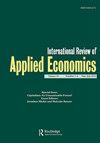劳动力市场刚性与全要素生产率:对印度证据的重新审视
IF 1.6
Q3 ECONOMICS
引用次数: 0
摘要
摘要现有的与印度劳动法相关的劳动力市场刚性实证研究表明,刚性对全要素生产率(TFP)产生了不利影响。在这篇论文中,我们根据文献的最新进展,在劳动保障立法导致劳动力投入调整存在制度刚性的情况下,改进了劳动力市场灵活性和工厂水平TFP的时空变化的测量。我们使用1999-2000年至2016-17年工业年度调查面板数据中的制造厂不平衡面板来分析劳动力市场刚性/灵活性与TFP之间的关系。我们发现,属于就业保障立法范围内的机构的生产力高于不属于就业保障法律范围的机构。结果表明,与工作保障条款相关的刚性不会损害TFP,而更高的灵活性与TFP呈负相关。然而,我们发现不同行业群体的灵活性-TFP关系存在相当大的异质性。灵活性-全要素生产率关系的异质性表明,引入灵活性的劳动力政策可能会提高某些行业的全要素生产率,同时降低其他行业的全因素生产率。本文章由计算机程序翻译,如有差异,请以英文原文为准。
Labour market rigidity and total factor productivity: a re-examination of the evidence from India
ABSTRACT The existing empirical studies concerning labour market rigidity associated with the labour laws in India suggest an adverse impact of rigidity on total factor productivity (TFP). In this paper, we improve upon both the measurement of spatiotemporal variation in labour market flexibility and plant-level TFP from production function estimates in the presence of institutional rigidity in labour inputs adjustment due to job security legislation based on the recent advancement in the literature. We use an unbalanced panel of manufacturing plants from the Annual Survey of Industries panel data from 1999–2000 to 2016–17 to analyse the relationship between labour market rigidity/flexibility and TFP. We find that establishments that fall under the purview of job security legislation have higher productivity than those outside the ambit of job security legislation. The results suggest that rigidity associated with job security provisions does not harm TFP, and higher flexibility is negatively associated with TFP. However, we find considerable heterogeneity in the flexibility–TFP relationship across various industry groups. The heterogeneity in the flexibility–TFP relationship suggests that flexibility-inducing labour policy may improve TFP in some industries and, at the same time, decrease it in others.
求助全文
通过发布文献求助,成功后即可免费获取论文全文。
去求助
来源期刊

International Review of Applied Economics
ECONOMICS-
CiteScore
4.30
自引率
4.50%
发文量
37
期刊介绍:
International Review of Applied Economics is devoted to the practical applications of economic ideas. Applied economics is widely interpreted to embrace empirical work and the application of economics to the evaluation and development of economic policies. The interaction between empirical work and economic policy is an important feature of the journal. The Journal is peer reviewed and international in scope. Articles that draw lessons from the experience of one country for the benefit of others, or that seek to make cross-country comparisons are particularly welcomed. Contributions which discuss policy issues from theoretical positions neglected in other journals are also encouraged.
 求助内容:
求助内容: 应助结果提醒方式:
应助结果提醒方式:


